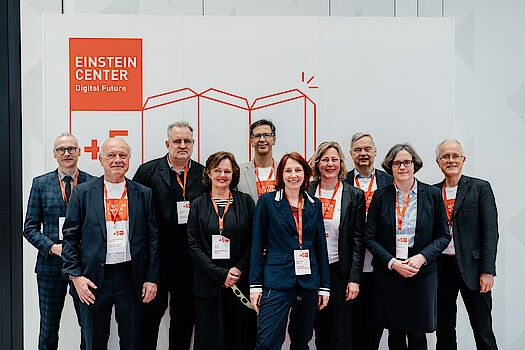In this second funding phase, the more than 30 ECDF professors will conduct future research on the new focus areas of "Integrated Health," "Sustainable Cities," and "Transforming Communities." "I am very pleased that we were able to convince the international panel of experts with our previous scientific results to continue the necessary research in the field of digital transformation here in Berlin," says Prof. Dr. Gesche Joost. The professor of design research at the Berlin University of the Arts has been the executive chair of the ECDF board since April 1, 2023. "With the second funding phase 'ECDF-Next Generation', we are adding three new key topics to our agenda that can provide answers to current challenges our society is facing on digital medicine, sustainable cities and societal transformation. Not least the Corona pandemic and the climate crisis make it clear to us every day that digitization must be part of the solution," Joost continued.
About the ECDF's three new research focus areas
The "Transforming Communities" area reflects the ECDF mission that digitization should serve people and society. Among other things, the scientists are concerned with strengthening the social cohesion of our communities in the digital society, from the individual and his/her body to communities in the global south.
In the area of "Integrated Health", one of the topics will be the use of digital tools to connect medical professionals and patients. The professors will explore how digital technologies can be used in the diagnosis of diseases and their treatment.
"Sustainable Cities" will address the increasing demands on cities such as climate resilience, new governance models and social justice. Research will focus, for example, on how digital technologies can help build trust between citizens* and policymakers, or how urban planners and engineers can use data, algorithms and IT systems to build resilient infrastructures and inclusive cities.
Successes of the first funding phase
A total of 45 ECDF professors* were appointed at Berlin universities and Charité - Universitätsmedizin in the first funding phase using the public-private partnership funding instrument. From April 2017 to March 2023, more than 30 interdisciplinary research projects were carried out. Thematically, these range from the use of smart textiles to improve collaborative rehearsals of music ensembles at a distance, to digital hate speech and conspiracy ideologies in times of the COVID-19 pandemic, to the use of quantum repeaters in space and algorithms to detect potentially malignant changes in the oral mucosa.
In the first funding phase, the professors at the ECDF have raised more than 100 million euros in third-party funding. More than five professors had already been awarded full professorships at national and international universities before the interim evaluation. For example, the first ECDF professor, Dr. Sergio Lucia, took over the chair of "Process Automation Systems" at TU Dortmund University in 2020, a W2 professorship with tenure track to W3. Ten others will be tenured by the ECDF at Berlin universities, such as Professor Dr. Berit Greinke, who has taken up a W2 professorship at the Berlin University of the Arts on April 1, 2023. ECDF professors have been awarded with important prizes, for example Prof. Dr. Philipp Staab with the Hans-Matthöfer-Prize for Economic Journalism and Prof. Dr. Andrea Cominola with the Early Career Research Excellence Award of the International Environmental Modelling and Software Society.
With the partners of the ECDF, more than 300 events with more than 13,000 guests were held, on-site or purely digitally during the pandemic. In addition to the scientific community, the ECDF attaches great importance to the involvement of Berlin's civil society. In Citizen Science projects such as SimRa, which was awarded the German Bicycle Prize in 2022, cyclists can use a smartphone app to record near-accidents in accordance with data protection regulations, or the project "Citizen-based Monitoring for Peace & Security in the Era of Synthetic Media and Deepfakes", citizens can contribute to arms control and disarmament. Furthermore, the research center participated in the Berlin Science Week, the Long Night of Science and the Knowledge City Berlin.

